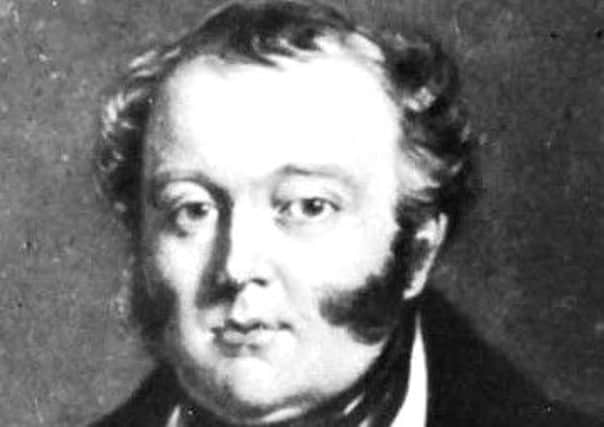Liam Byrne: Time to celebrate railway king George Hudson, an engineer who made Britain


Open a history book and you’ll get a thousand-year saga of kings and queens, soldiers and scientists, and rather too many politicians.
But what about the risk-takers, wealth-creators and entrepreneurs – the visionaries who made history by inventing the future?
Advertisement
Hide AdAdvertisement
Hide AdI think its time we re-told our national story – and put our entrepreneurs centre-stage. And for my money, love him or loathe him, Yorkshire’s George Hudson, Queen Victoria’s Railway Napoleon, is on my list of titans who helped build modern Britain.
Born in Howsham in 1800, Hudson arrived in a family poor, respectable and unlucky.
He lost his parents young and first graced official records aged just 15, with a 12s 6d fine for “Bastardy”. He escaped to York, where he found work as a draper’s apprentice in the little shop now run by the National Trust, a stone’s throw from the Minster.
And there his fortune turned.
He soon made a wife of his master’s sister, took a stake in the store, and inherited a whopping £30,000 in circumstances that were never entirely clear, from his uncle Matthew who lived round the corner.
The grand young man of York was on his way.
Advertisement
Hide AdAdvertisement
Hide AdWith wealth, time and bags of attitude, Hudson turned to politics, proving a quick master of time-honoured art of bribing voters for the York Tory party.
His new friends secured him a spot as a founder of the city’s new bank and centre-stage in the debate about how to bring “railway mania” to York.
Partnering with railway pioneer, George Stephenson, Hudson soon had a plan to connect sleepy York to the booming Georgian county around it.
On Wednesday, May 29, 1839, the morning sun shone, the Minster bells rang and the cannon boomed.
Advertisement
Hide AdAdvertisement
Hide AdAnd thousands of men and women lined the track, banks and bridges of the new York and North Midland Railway to wave off the town’s first steam train.
It was the start of an extraordinary journey.
Over the next 20 years, Hudson not only secured the honour of becoming York’s Lord Mayor but captured the chairmanship of railway after railway, rolling up a myriad of companies that together carved a iron road from Edinburgh to London, via Newcastle.
On June 18, 1844, Hudson presided over the grand opening of the Newcastle and Darlington Junction Railway. At 5am, a special train left Euston carrying the chairman of the London and Birmingham, and drew into Gateshead at 2.25pm.
The Thames and the Tyne were now connected by rail, fulfilling Stephenson’s long cherished ambition to see the day when “the mails would be carried by steam power from London to his native Newcastle”.
Advertisement
Hide AdAdvertisement
Hide AdBy the age of 48, Hudson’s empire controlled almost a third of the English railway system.
His orbit now stretched wide. After winning the seat of Sunderland, he took a seat in Parliament and promptly opened court at Albert Gate, one of the capital’s grandest addresses.
His parties were soon as famous as Mrs Hudson’s affectations (she was cruelly labelled “the Mrs Malaprop of her day”) and his ever-more slurred speeches in the Commons.
But his shareholders loved him. He kept costs low (dangerously low in fact) and dividends high.
Advertisement
Hide AdAdvertisement
Hide AdIndeed, in the magical archives of the York Railway Museum today lies the extraordinary vellum petition from the shareholders of the Eastern Counties Railway, imploring the installation of Hudson as their chairman.
His success, however, was not honest.
Hudson was paying dividends, not out of profits, but out of shareholders’ funds – and helping himself along the way.
Soon his cover was blown as enquiry after enquiry stripped bare his fraudulent methods, and when he lost his seat in 1859, he was never more than a prayer away from the debtor’s jail.
He escaped to the Continent, only coming home when jail was removed as a sentence for debt. He died in London in 1871.
Advertisement
Hide AdAdvertisement
Hide Ad“The happiest part of my life was when I stood behind the counter and used the yard measure in my own shop,” said Hudson in his final years.
He was the best and worst of Britain’s breath-taking railway age which delivered an economic revolution worth more than the Empire – which created the investors and engineers who built railways around the world, drawing the globe ever closer.
By the First World War, a quarter of the £4.2bn of British capital invested abroad was tied up in foreign railways.
No-one would try and explain the 21st century without explaining great innovators like Bill Gates or Steve Jobs. And that’s why we can’t understand our past without understanding extraordinary men like George Hudson, and the incredible change he helped to author by fair means and foul.
Liam Byrne is a Labour MP and former Cabinet minister. He is author of Dragons: Ten Entrepreneurs Who Built Britain which is published next Thursday by Head of Zeus.